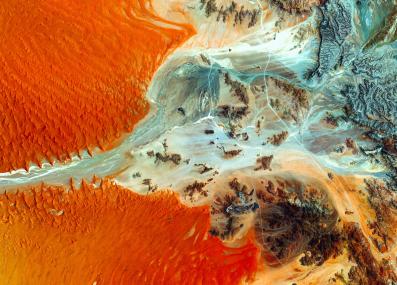Have a question?
Has there been climate change before?
The Earth’s climate is always changing, but human-caused climate change today is unlike any other period in our planet’s history.
January 4, 2021
The Earth’s climate and atmosphere have changed drastically over the last 4.5 billion years. Today’s global average temperature is around 59°F, but scientists estimate it has been as low as 10°F1 (during “snowball Earth” events) and as high as 95°F or above2 (so hot the Arctic North resembled today’s tropics). The atmosphere has changed too: Earth used to have very little oxygen, until the first cyanobacteria (or “blue-green algae”) showed up and started producing it. Today, oxygen is the second-most common element in the atmosphere.
But if we want to better understand how the Earth may respond to the rising levels of carbon dioxide (CO2) in the atmosphere that we’re experiencing today, we should look to a particular event around 56 million years ago, says Professor Kristin Bergmann of the MIT Earth and Planetary Sciences Department. This is the “Paleocene-Eocene Thermal Maximum” (PETM), an era of high temperatures and acidifying oceans.
So what happened to the Earth during the PETM? Due to volcanic eruptions, CO2 levels in the atmosphere increased 3-4 times. Just like today, rising levels of this greenhouse gas led to global warming. Temperatures in the tropics may have averaged over 100°F,3 and even the arctic was warm enough to support swampy forests and crocodiles. Oceans acidified, changing ecosystems by breaking down animal shells and weakening coral reefs. There were also changes in storm intensity and rainfall, which impacted ecosystems on land.
We can expect the Earth today to react to rising CO2 levels much the same way it did in the PETM. The continents looked pretty similar 56 million years ago—which affects the way ocean and atmospheric currents move around the Earth. The atmospheric change was fairly comparable too, as a significant amount of CO2 and other greenhouse gases were added to the atmosphere very quickly. The PETM “is recent enough in Earth’s history that we can track changes in the Earth system the same way that we track changes today,” says Bergmann.
Ultimately, after millions of years, the Earth was able to revert back to lower temperatures and less acidic oceans. But “it’s really important to think about timescale,” says Bergmann. “While geology and biology can do great things to help the Earth recover after a climate perturbation, they have limited effect over human timescales.”
And while the PETM shows us that greenhouse gases have warmed the Earth in the past, today’s human-caused climate change is happening much faster. In 2019 alone, we emitted more than 35 billion tons of CO2 into the atmosphere,4 a rate faster than any geological processes. Climate models suggest that, in the near future, these rapid CO2 emissions could raise temperatures until they rival those from the PETM. Bergmann also says that it’s not so far off to imagine a world where we warm and acidify the oceans so quickly that we kill off ocean creatures that help the ocean absorb carbon. “It’s easy to envision a scenario where we drive the Earth’s systems to an extreme example of what we’ve seen in the past,” Bergmann says.
But Bergmann says there’s another, even bigger difference between climate change 56 million years ago and today. “Human beings are conscious while climate change is happening,” she says. “We see it affecting our lives. It feels unique because we’re actually experiencing it, and we have the potential to act in great and monumental ways to try and preserve today’s climate.”
Submit your own question to Ask MIT Climate
Get the latest from Ask MIT Climate monthly in your inbox
1 Hoffman, Paul F., et al. "Snowball Earth climate dynamics and Cryogenian geology-geobiology." Science Advances, vol. 3, no. 11, Nov 2017, doi:10.1126/sciadv.1600983
2 Voosen, Paul. "Project traces 500 million years of roller-coaster climate." Science, vol. 364, issue 6442, May 2019, pp. 716-717, doi:10.1126/science.364.6442.716
3 Van Dijk, Joep, et al. "Spatial pattern of super-greenhouse warmth controlled by elevated specific humidity." Nature Geoscience 13, October 2020, pp. 739-744. doi:10.1038/s41561-020-00648-2
4 Friedlingstein, Pierre, et al. "Global Carbon Budget 2019." Earth System Science Data, 11, 2019. doi:10.5194/essd-11-1783-2019.








